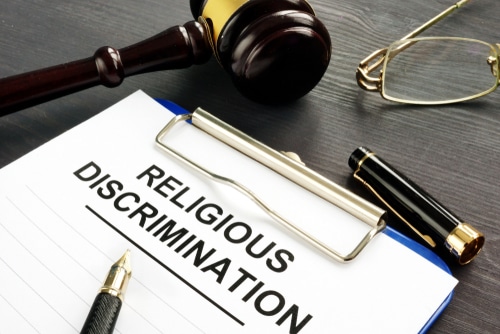Updated: January, 25, 2021
Federal, state and many local laws prohibit discrimination against individuals based on their religious beliefs, in hiring, firing or any other terms and conditions of employment. Such laws apply to those who have sincerely held religious, ethical or moral beliefs, as well as atheists or agnostics.
Discriminatory acts include any type of employment decision based on religious preference as well as religion-based harassment. In addition, employers may be found to have discriminated against an employee by failing to reasonably accommodate the employee’s religious beliefs and practices. Reasonable accommodations are required except where it poses an undue hardship, as further discussed below.
However, there are differences between the various laws, including which employers are subject to the law, and the remedies available to employees who have been discriminated against. Understanding these rules is essential to minimizing, proving or defending against discrimination claims.
FEDERAL LAW
Title VII of the Civil Rights Act of 1964 prohibits religious discrimination as noted above. The law applies to all federal, state and local government employers; private employers with at least 15 employees; private and public employment agencies; labor organizations; and joint labor-management committees controlling apprenticeship and training.
The Equal Employment Opportunity Commission (EEOC) is responsible for investigating claims of religious discrimination or lack of accommodation in workplaces under Title VII.
NEW YORK LAW
Unlike federal law, New York State and New York City law apply to all employers. Notably, New York state law also expressly prohibits employment discrimination based on attire, clothing or facial hair worn as a form of religious observance. For example, a dress code that prohibits a hijab, turban or yarmulke could constitute religious discrimination. Employees may request reasonable accommodation; however, the employer could counter with an undue hardship defense as discussed further below.
The New York State Office of the Attorney General Civil Rights Bureau investigates and prosecutes patterns and practices of religious discrimination. Individual complaints of religious discrimination under the New York State Human Rights Law are handled by the New York State Division of Human Rights.
In New York City, the city’s Commission on Human Rights is charged with the enforcement of its Human Rights Law.
RELIGION-BASED HARASSMENT
Religious discrimination laws also protect employees from harassment based on their religion. Examples may include making jokes or offensive comments about a person’s religion or religious practices.
Under federal law, harassment is illegal when it is so frequent or severe that it creates a hostile or offensive work environment or when it results in an adverse employment decision (such as the victim being fired or demoted). State law does not require that the harassment be severe or pervasive, but that the employer has an affirmative defense to liability if the harassing conduct does not rise above the level of what a reasonable victim of discrimination with the same protected characteristic or characteristics would consider petty slights or trivial inconveniences.
REASONABLE ACCOMMODATION AND UNDUE HARDSHIP DEFENSE
Religious accommodation is an adjustment to the work environment that will allow an employee to practice his or her religion. Typically, accommodations are requested by employees when a specific task or requirement of the position conflicts with an individual’s religious beliefs, observances or practices. For example, an employee may request not to work on the Sabbath or may request an exception to the employer’s dress code that would not permit the employee to otherwise wear religious garb.
Employers are required to provide reasonable accommodation If it would not pose an undue hardship. Factors relevant to determining undue hardship include the type of workplace; the employee’s duties; the relative cost to the employer; the effect on workplace safety, efficiency, and the rights of other employees; and whether it violates the terms of a collective bargaining agreement or job rights established through a seniority system.
Typical examples of accommodations include flexible schedules and scheduling changes, exceptions to dress codes or designation of a work location for prayer.
RETALIATION
Under both federal, state and city law, retaliation by an employer against an employee who makes a claim or asserts a right protected by discrimination laws is prohibited. Examples of potential retaliation include dismissal, demotion, disciplinary action, cut in work hours or pay, reassignment to a less desired work location and other actions penalizing a worker.
AVOIDING AND ADDRESSING RELIGIOUS DISCRIMINATION
Employers should develop appropriate policies regarding reasonable accommodations, dress codes and other areas likely to result in religious discrimination claims. Appropriate training of supervisors and hiring managers is a must to minimize potential discriminatory actions. In addition, a written employee handbook is necessary and should include the company’s policies against discrimination and outline complaint procedures. In the event of a complaint, employers should consult legal counsel regarding the investigation and documentation of the allegations and any actions taken by the employer.
Applicants or employees who believe they have experienced religious discrimination should document their claim and keep careful records of discriminatory conduct, the employer’s response to the complaint, and any retaliatory actions.
Contact Romano Law today to talk to one of our attorneys about your potential religious discrimination case!




